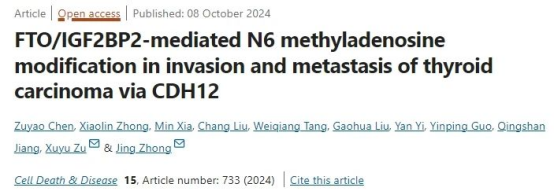In recent years, the global reported incidence of thyroid cancer has been continuously increasing. Although most papillary thyroid carcinomas present an indolent clinical course, there are still some cases that developlocaldistant metastases. In cases of recurrencemetastasis, while surgery, radioactive iodine ablation,combined thyroid hormone suppression therapy can provide a favorable prognosis for most patients, some patients eventually progress to a refractorydisease ordeath. Anaplastic thyroid carcinoma has a low incidence but a high degree of malignancystrong invasiveness. Itoften develops extensive invasionmetastasis within months, leading to the death of patients in a short time. Therefore, whether it is papillary thyroid carcinoma with a high incidenceanaplastic thyroid carcinoma with a high lethality rate, extensive invasiondistant metastasis are the main factors affecting the prognosis of thyroid cancer. So it is crucial to explore the mechanisms of invasionmetastasis of thyroid cancer.
Recently, the research team led by Prof. Zhong JingProf. Zu Xuyu from the First Affiliated Hospital of University of South China published an important research achievement titled “FTO/IGF2BP2 - mediated N6 methyladenosine modification in invasionmetastasis of thyroid carcinoma via CDH12” in Cell DeathDisease (a top journal in the Q1, CAS, IF=8.1). This study took epigenetic modification—RNA methylation modification (m6A) as the entry point to explore the molecular mechanism of thyroid cancer invasionmigration. The authors first confirmed in clinical samples that the m6A levels were significantly elevated in papillary thyroid carcinoma with the highest incidenceanaplastic thyroid carcinoma with the highest lethality rate. They also found thattheelevated m6A levels were induced by thedownregulationof demethylase fat massobesity-associated protein (FTO). Further cellularanimal experiments confirmed that FTO plays an important role in inhibiting the invasionmigration of thyroid cancer. In the exploration of the mechanism, the authors confirmed that CDH12 (Cadherin 12) is the key target gene of FTO in regulating the invasionmigration of thyroid cancer,IGF2BP2 (insulin-like growth factor 2 mRNA-binding protein 2) is the key m6A reader protein that recognizes the m6A modification of CDH12 RNAregulates its stability. Inhibiting the expression of CDH12IGF2BP2 can significantly inhibit the invasionmigration ability of thyroid cancer. Therefore, this study put forward that FTO, CDH12,IGF2BP2 may be effective therapeutic targets for thyroid cancer with invasionmetastasis.

This study was funded by the National Natural Science Foundation of Chinathe Natural Science Foundation of Hunan Province. Chen Zuyao, Associate Chief-Physician from the Department of Otorhinolaryngology HeadNeck Surgery,Zhong Xiaolin, Associate Professor from the Institute of Endocrinology of the First Affiliated Hospital of University of South China are the co-first authors of this paper. The First Affiliated Hospital of University of South China is the sole affiliation for both the first authorcorresponding author.

